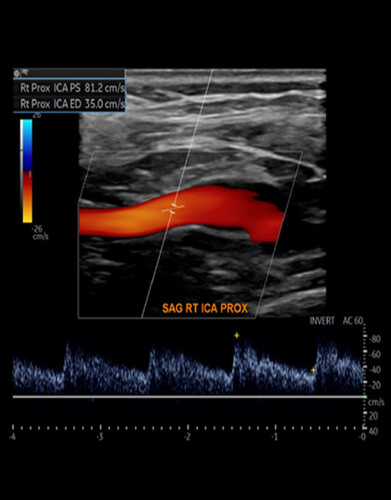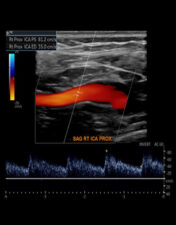This 40-lecture online CME course introduces you to every facet of non-invasive vascular testing. Many case study resources and more than 100 registry-style test questions will aid people who work in the non-invasive vascular laboratory in getting ready for the RPVI exam and meeting the CME requirements for IAC Vascular Testing. Expanded content on vascular lab operations and ergonomics is presented by nationally recognized lecturers, who also offer insightful information on:
Imaging methods (grayscale, spectral and color Doppler, and physiological testing)
various diagnostic standards and testing procedures
Fundamentals of vascular physics include a wide range of vascular pathologies, both common and uncommon.
Safety for patients and quality improvement
And more…
Individualized Learning Goals
After taking this course, you ought to be able to:
Understand the fundamental principles of ultrasound physics and how they apply to vascular ultrasonography and physiologic testing.
Recognize typical imaging and Doppler artifacts seen in the vascular lab
To help in the identification of arterial and venous illness, employ spectral Doppler waveforms, color Doppler analyses, and grayscale imaging.
Utilize your interpretation abilities to use duplex ultrasonography to detect internal carotid artery stenosis.
Utilize your interpretation abilities to use duplex ultrasonography to detect venous thrombosis and venous valvular reflux.
To evaluate the degree and anatomic location of lower limb artery disease, use arterial duplex and physiological tests.
Utilizing duplex ultrasound, use conventional diagnostic criteria to identify renal and mesenteric artery stenosis and abdominal aortic aneurysm (AAA).
After endovascular AAA repair, evaluate the patency of arterial and venous stents using color and spectral Doppler analysis.
Recognize unusual and uncommon vascular conditions seen in the vascular laboratory
Utilize best practices for managing a high-quality vascular laboratory, such as a quality improvement program, accreditation, and technical staff WRMSD prevention.
To increase readiness for the ARDMS Registered Physician in Vascular Interpretation (RPVI) test, identify knowledge gaps.
TOPICS / SPEAKERS:
Basics of Laboratory Technology and Operations
Preparing for the Registry Examination – Heather L. Gornik, MD, RVT, RPVI, MSVM
Physics and Instrumentation I – Fredrick Kremkau, PhD
Physics and Instrumentation II – Fredrick Kremkau, PhD
Transducer Selection, Image Optimization, Spectral and Color Doppler, and B-Mode Artifacts – Ann Marie Kupinski, PhD, RVT, RDMS, FSVU
Quality Improvement in the Vascular Laboratory – Heather L. Gornik, MD, RVT, RPVI, MSVM
Fundamentals of Ergonomics in the Vascular Lab – Jill Sommerset, RVT
Cerebrovascular
Basics of the Carotid Duplex Examination and Criteria for Diagnosis of Internal Carotid Artery Stenosis – Heather L. Gornik, MD, RVT, RPVI, MSVM
Carotid Evaluation Following Stents and Endarterectomy, Interpretive Pitfalls – R. Eugene Zierler, MD, RPVI, FACS, FSVM
Non-atherosclerotic Cerebrovascular Disease – Duplex Findings – Daniella Kadian-Dodov, MD, RPVI, FSVM
Aortic Arch Vessel and Vertebral Artery Findings, Subclavian Steal – Daniella Kadian-Dodov, MD, RPVI, FSVM
Transcranial Doppler Essentials – Larry Raber, RVT, RDMS, RT
Interpretive Case Review – Carotid, Vertebral, and Subclavian Arteries – Rapid Fire Cases – Aditya Sharma, MBBS, RPVI, FSVM
Peripheral Arterial
Lower Extremity Arterial Physiological Testing – Ana Casanegra, MD, RPVI, FSVM
Lower Extremity Arterial Duplex – R. Eugene Zierler, MD, RPVI, FACS, FSVM
Upper Extremity Arterial Testing – Marie D. Gerhard Herman, MD, RVT, RPVI
Pedal Artery Duplex and CLTI Duplex Imaging – Jill Sommerset, RVT
Arterial Access Complications – Natalia Fendrikova-Mahlay, MD, RPVI
Dialysis Access Mapping and Post Procedure Evaluation – Ann Marie Kupinski, PhD, RVT, RDMS, FSVU
Interpretive Case Review – Physiologic Testing and Duplex of Native Upper and Lower Extremity Arteries – Rapid Fire Cases – Aditya Sharma, MBBS, RPVI, FSVM
Interpretive Case Review – Duplex Assessment of Arterial Bypass Grafts and Stents – Rapid Fire Cases – Ido Weinberg, RPVI, FSVM
Interpretive Case Review – Access Complications, Dialysis Access, Vascular Zebras – Rapid Fire Cases – Jeffrey Olin, DO, RPVI, MSVM
Abdominal
Renal (Native and Transplant) Duplex Ultrasound, Renal Stents – Natalie Evans, MD, RPVI, FSVM
Mesenteric Artery Duplex Ultrasound, Mesenteric Stents – Natalia Fendrikova-Mahlay, MD, RPVI
Assessment of the Aorta, Surveillance of AAA, and Follow-up of Aortic Endografts – R. Eugene Zierler, MD, RPVI, FACS, FSVM
Duplex Doppler Assessment of Hepatic-Portal Vasculature – Nirvikar (Nirvi) Dahiya, MD
Interpretive Case Review – Abdominal Imaging – Abdominal Aorta, AAA; and Endografts; Renal and Mesenteric Ultrasound – Rapid Fire Cases – Natalie Evans, MD, RPVI, FSVM
Interpretive Case Review – Abdominal Imaging – Aortic, Mesenteric, Renal and Pelvic Arterial and Venous Compression Syndromes, Arteriopathies – Rapid Fire Cases – Jeffrey Olin, DO, RPVI, MSVM
Peripheral Venous
Venous Duplex for Diagnosis of Deep Venous Thrombosis – Marie D. Gerhard Herman, MD, RVT, RPVI
Bare Bones for the Boards – Venous Physiological Testing – Ana Casanegra, MD, RPVI, FSVM
Venous Duplex for Assessment of Venous Valvular Incompetency, Mapping for Endovenous Therapies, Assessing for EHIT – Raghu Kolluri, MD, RVT, FSVM
Venous Duplex for Assessment of Central Veins – Karem Harth, MD
Interpretive Case Review – Venous Testing 1 – Rapid Fire Cases – Karem Harth, MD
Interpretive Case Review – Venous Testing 2 – Rapid Fire Cases – Raghu Kolluri, MD, RVT, FSVM
Mock RPVI Examinations and Additional Talks
Key Non-Vascular Incidental Findings Every Reader Should Know – Nirvikar (Nirvi) Dahiya, MD
Physics, Technology, and Instrumentation Mock RPVI Examination – Ann Marie Kupinski, PhD, RVT, RDMS, FSVU
Mock Examination Questions – Session I – Randy Ramcharitar, MD
Mock Examination Questions – Session II – Ido Weinberg, RPVI, FSVM
Mock Examination Questions – Session III – Aditya Sharma, MBBS, RPVI, FSVM
Mock RPVI Examination Questions – TCD and TCI – Larry Raber, RVT, RDMS, RT
Mock Examination Questions – Essentials of Accreditation, Patient Care and Safety, Quality Assurance, and Test Validation – Heather L. Gornik, MD, RVT, RPVI, MSVM


